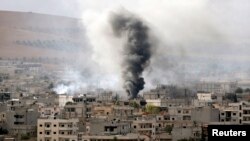In Turkish villages along the border, local Kurds and refugees from the Syrian city of Kobani maintain a vigil observing the month-long battle over the besieged town with a mixture of hope and dread.
But with news that the Islamist jihadists are pouring in reinforcements, their fears are mounting that the town will fall.
The stiff defense of Kobani in the face of a monthlong assault by Islamic State militants is a source of great pride for Kurds on both sides of the Syrian-Turkish border.
Refugees remain hopeful
Refugees from the mainly Kurdish Syrian town along with Turkish Kurds watching the battle still cling to the hope that the outnumbered and outgunned defenders can hold on.
But news that the Islamic State group, also known as ISIL, is pouring reinforcements into Kobani, also known as Ayn al-Arab, is prompting alarm.
Capturing Kobani would give the Islamic State group a direct link between its positions in the Syrian province of Aleppo and its stronghold of Raqqa, to the east.
Ali, a 47-year-old shepherd from a Turkish village near here, said his 18-year-old daughter, Aven, is fighting in Kobani with the Kurdish defense force, the YPG.
Ali said that in his daughter's latest cellphone call to him from inside the virtually encircled city, she lamented the mismatch between the opposing sides in the numbers of fighters, saying that she does not know where all the jihadists come from.
He said Aven complained about the Turkish government’s refusal to allow a corridor between the border and Kobani so Kurdish volunteers from Turkey and Syria could join the fight.
Unequal numbers in fight
If there were equal numbers, Aven argued to her father, the Kurds would beat the Islamic State militants and hold Kobani.
Western and U.N. officials have echoed the sentiments of the 18-year-old Kurdish girl who slipped over the border into Syria to join the YPG six months ago to fight without telling her parents of her plans.
But the Turkish government is refusing to allow Kurdish reinforcements in to relieve the flagging defenders, prompting Kurds to accuse Ankara of being in a secret partnership with the Islamic State group, or at least seeing the Kurds as a greater danger than the Islamic militants.
For 30 years, Turkey has battled a self-rule insurgency, mounted by the Kurdistan Workers’ Party, or PKK, and the YPG is an offshoot of the PKK. There is now a faltering peace process with Turkish Kurds, but PKK activists said if Kobani falls, then the peace process will be finished.
However, U.S. National Security Adviser Susan Rice said on Sunday that Turkey had agreed to allow U.S. and coalition forces to use its bases, including a key installation within 100 kilometers of the Syrian border for operations against Islamic State militants in Syria and Iraq.
Speaking on NBC's Meet the Press, Rice also said Ankara had agreed to train the moderate Syrian opposition within its borders.
"We are continuing to talk to the Turks about other ways they can play an important role. They are already essential in trying to prevent the flow of foreign fighters," Rice said.
However, later Monday, Turkey said it has not agreed to allow U.S. forces to use a base in the country to launch operations against Islamic State militants in Syria and Iraq.
A Pentagon team was set to travel to Turkey this week to finalize the plans, but it was not known how Turkey's statement might affect that trip. Turkish officials hosted talks last week with retired U.S. General John Allen and State Department official Brett McGurk.
Violent Kurdish protests during the past several days in towns across Turkey have left nearly 40 dead. And the government is braced for more problems with soldiers deployed for the first time in years again in Kurdish towns.
Situation in Kobani is dire
Abu Bakr Omar Abdullah, a member of the Iraqi Kurdistan parliament who visited briefly in Kobani a few days ago, said the situation is dire and the defenders have small arms while the Islamic State militants are equipped with larger weaponry, including tanks.
Abdullah said the defenders remain determined.
He said the fighting is merciless and much if it now is street-by-street and house-by-house.
The Kurds are only holding about a third of the town, mainly in the north-central area and YPG sources said there is just a narrow exit to Turkey.
The U.S. began airstrikes against the Islamic State group in Iraq in late August and expanded the campaign along with several partner nations into Syria last month.
U.S.-led coalition airstrikes on the jihadists in Kobani have helped the Kurds to hold out, but American officials said it is only a matter of time before Kobani falls.
Also Monday, an Islamic State suicide bomber detonated a truck laden with explosives in the northern part of Kobani, near the Turkish border crossing with Syria, a monitoring group and Kurdish sources said on Monday.
The attack took place about 2 kilometers north of Kobani, which has been the scene of heavy clashes between Kurdish forces and Islamic State fighters, who have tightened their grip on the city, the Syrian Observatory for Human Rights and Kurdish officials said.
And in Iraq, the French news agency AFP reported that Iraqi government troops near Hit in Anbar province withdrew to the Asad air base, leaving the Islamic State group in full control of Hit, one more advance for the jihadists.
Some material for this report came from Reuters and AP.




